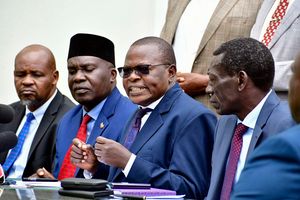
Teachers Service Commission CEO Nancy Macharia.
In the sunset days of her 10-year tenure at the helm of the Teachers Service Commission (TSC) Nancy Macharia has enumerated her achievements, which have however been overshadowed by a string of bungled implementation of skewed policies.
From claims of high-handedness, defiance of court orders, favouritism in promotion of teachers, non-implementation of collective bargaining agreements (CBAs), arbitrary and illegal issuance of employment letters by politicians, Ms Macharia has waded through the storm.

TSC CEO Nancy Macharia when she appeared before the Constitutional Implementations oversight committee at the Continental House Nairobi on Tuesday, April 8, 2025.
The contested promotion of 25,000 teachers is one of the latest strings of accusations facing her administration, even as she seeks to paint a picture of success.
“I can only look back with an incredible tinge of satisfaction over the milestones achieved (in the 10 years in office). Being at the helm has been an extraordinary privilege and I am proud of what we have accomplished as a team,” Ms Macharia stated in the latest edition of Image, a TSC biennial booklet, the last she will be penning as the CEO of the commission.
However, she will also be remembered as a CEO who suffocated the trade unions – the Kenya National Union of Teachers (Knut) and the Kenya Union of Post Primary Education (Kuppet) – sinking and raising their membership at will.
Ms Macharia lists her achievements to include “registration of teachers, appraisals, performance contracts, Teachers Professional Development, Retooling of teachers, and Teachers Induction Mentorship and Coaching Programme (TIMEC)”.
She states that in 10 years, TSC registered 229,410 trained teachers in the country while the teacher establishment grew by 101,000 under the period.
“The teacher establishment has grown in 10 years from 311,665 (in 2015) to 413,653 (in 2025),” Ms Macharia said.
“There has been a retooling of 229,000 primary school and 55,125 of the expected Junior School teachers (comprising of 91.7 percent) to handle the competency-based curriculum.”

Teachers Service Commission CEO Nancy Macharia (centre) speaks to the media on the sidelines of the Kenya National Schools Principals Forum in Mombasa April 22, 2025.
Despite criticism over her handling of industrial disputes, which entailed starving unions of membership fees to arm-twist the leadership to call off strikes, she claims that there has been industrial harmony during her tenure.
The outgoing CEO has also been accused of failing to implement CBAs with trade unions to the chagrin of teachers and union officials.
“CBC and CBA implementation has seen retooling of 229,292 primary teachers, 75,000 junior school and 154,292 secondary school teachers; equipping them with requisite content, skills, competencies, values and attitudes to implement the new curriculum and assessment,” Ms Macharia stated.
She noted, “A total of 56,519 teachers have been sensitised on the programme with 1,712 field officers, 28,741 boards of management and 38,354 heads of institutions having their capacities built in management of teacher conduct.”
“In 2017, Sh54 billion was ring-fenced to enhance teachers’ personal emoluments over five years. A non-monetary CBA II, leading to enhanced maternity and paternity leaves for teachers,” Ms Macharia highlighted, noting that maternity leave was raised to 150 days.
Legal, labour and industrial relations, teachers discipline management, teacher professional management and operations directorate, supply chain management services (SCMS), corporate affairs and risk management units are some of the key departments established under her tenure.
However, the introduction of career progression guidelines (CPGs) has been most criticised as it altered how teachers moved up the career ladder. Automatic promotions based on higher education qualifications was stopped although thousands of teachers had sought the papers.
Instead, they use a “Teacher Performance Appraisal and Development (TPAD) tool with which heads of institutions provide oversight role in the performance appraisal for teachers in the respective institutions as required by section 52 of the Code of Regulations for Teachers (2015),” Ms Macharia said.
TPAD, which was deployed in 2016 to enhance teacher appraisals, is implemented in primary, secondary, teachers training colleges and special needs education institutions.
Ms Macharia also mentions the decentralisation of services among her achievements, with 394 sub-county offices having been set up countrywide, and TSC offices constructed in Bomet, Machakos and Kilifi counties. The commission plans to construct additional offices in Kwale, Murang’a and Kitui counties.
“Teacher registration, recruitment, promotion and intra-regional transfers is fully decentralised and digitisation of services has been implemented,” Dr Macharia said.
She noted that the priority programmes that require strategic focus include the newly rolled out Remote Learning Methodologies, and the digitisation and automation of records and functions.
“As I conclude my journey at TSC, I leave the commission with stable established structures to effectively manage all the resources and assets up to the zonal levels,” she stated.
The latest battle over the teachers’ union membership is the placing of 46,000 teachers in junior schools under Kuppet, a move that Knut contests.
“The law is very clear on the membership of a trade union by teachers. The Labour Relations Act states that one becomes a member of a union by filling a membership form, which has not happened in the current case,” said Collins Oyuu, the secretary-general of Knut.
As she exits, Ms Macharia says the TSC requires Sh35.4 billion to address the backlog in promotions with 178,881 pending cases, adding that 151,611 teachers in primary and secondary schools had been promoted in the last three years.
She admitted that 66,828 teachers have stagnated in one job group for as long as eight years, 9,285 stuck in one position for between five and seven years, while 102,768 have stagnated between three and five years.
“Lack of sufficient budgetary provision for promotion of teachers has impeded the implementation of the Career Progression Guidelines (CPG) for teachers resulting in their stagnation,” Ms Macharia said.
A recent revelation by Murang’a Woman Representative Betty Njeri that MPs had been given TSC employment letters at State House ahead of a tour of Mount Kenya region by President William Ruto was a blot to Ms Macharia’s tenure.
“The interviewing, employment and even promotion of teachers has been hijacked by cartels, profiteers, racketeers and buccaneers whose main focus is transactional in terms of money or political loyalty,” said Mr Kipkirui Kap Telwa, a lawyer and journalism lecturer at Multimedia University.
“This is a well-oiled corruption scheme orchestrated by TSC top guns, politicians and cartels in the corridors of power. TSC should be held to account for the corrupt and immoral practice that has seen people close to the elite get employment letters without following due process,” he said.







